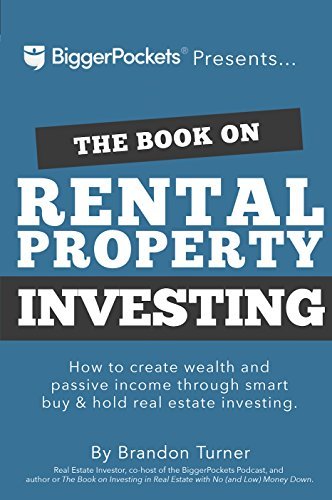The main reason most people look into real estate is so that they can start building wealth in rental properties.
Rental properties have proven to be one of the most reliable, attainable, and best-performing investment vehicles of all time. I’m sure you’ve already recognized this, or else you wouldn’t be here.
This article won’t be focusing on deal-making, or numbers, or any of that. The most important thing to do when building wealth in rental properties is to get your mind right.
Many successful companies beat the competition, and build a moat around them when they reach the top. Why is this?
Vision.
Management of these companies have a clear vision, and set a clear plan of steps to take to achieve that vision. Once they lose sight of that vision, things start falling apart, as we see many times.
When innovation stops, success stagnates.
The 5 Essentials to Building Wealth in Rental Properties tells you what you need to do in order to be prepared mentally for your real estate journey and beyond.
1. Think the Right Thoughts

This may sound simple, it may sound cliche, but it is something that you have to consciously recognize from an outside perspective. Most people do not think the right thoughts because they are stuck in their own bubble.
Thinking the right thoughts is not an external action you need to take, but an internal mindset you need to create.
Flip a switch in your head. Stop saying “I want to do this”, and instead start saying “I am doing this”.
We all know how to get six-pack abs. Eat healthier, cut, and work out heavily with high intensity, right? Why do most people not have a six-pack?
Well, when you aren’t considering it a priority, it doesn’t happen. If you really want a six-pack, you have to set a clear goal, with actionable steps along the way, and then take action.
Success is an action. Without action, success never comes.
1A. Write Down Your Goals, and Read Them Out Loud Everyday
To a lot of people, this sounds stupid. Many people thought this sounded stupid until Grant Cardone began doing it, and now 35 years later as over $700M in assets.

Grant Cardone talks about this in his book, The 10X Rule: The Only Difference Between Success and Failure. If you don’t have a clear goal, and that goal isn’t a priority, you are far more likely to never achieve it and keep dreaming.
You need to recognize your goals, put actionable steps in, and then multiple those steps and work 10 times as hard to achieve them, for 10 times the results.
BiggerPockets VP of growth Brandon Turner read the 10X Rule, and applied this exact technique. His original goal was to attain 100 units, but then he bumped his goal up to a seemingly outrageous 1,000 units!
Today, Turner has around 300 units, and is still pushing for 1,000. If he kept his goal at 100, he would only have 1/3 of what he could have achieved by now.
1B. You Are Who You Associate With
This is something you need to realize, before you get dragged down to the bottom.
“You are the average of the five people you spend the most time with.” -Jim Rohn

Environments love homestasis. If you hang out with someone a lot, you will naturally pick up some of their habits and tendencies, as they will pick up yours. This is why some friend groups boost you up, and some friend groups drag you down.
Be careful who you hang with.
1C. Change Your “I Can’t” to “How Can I?”
As Robert Kiyosaki explains, the “I can’t” mentality holds people at the bottom. What is possible suddenly becomes impossible, because people underestimate what they can accomplish.
When you start asking “How can I?”, instead of “I can’t”, you will engage your mind more, and you will learn more. You will become a better person, because you are opened up more opportunities and more capabilities that you didn’t realize you had.
2. Study the Right Source
Once you’ve started thinking the right thoughts, you have to begin learning. If you don’t learn, you can dig yourself into a hole that will take years to get out of.
A lot of people get overwhelmed with all of the knowledge available in real estate and investing. Wealth building in rental properties is a popular topic, covered by a multitude of different sources.
This typically leads to something called analysis paralysis, which is where you spend so much time studying and analyzing that you never make a deal. You never take action.
Studying doesn’t do you any good if you never apply what you learned.
How do you overcome analysis paralysis?
First, realize that you may be a victim of analysis paralysis if you are in that stage already, and then stop stretching yourself so thin. It is easy to get caught up in all of the ways to become successful, but you need to focus on one.
Find one that you think you would be able to apply best, and focus on it. No matter whether another strategy seems better at certain times, most strategies are strategies because they all work.
”I fear not the man who has practiced 10,000 kicks once, but I fear the man who has practiced one kick 10,000 times.” -Bruce Lee
In reference to Bruce Lee’s quote, a man that has practiced 10,000 kicks once isn’t good at any of them, much like in real estate. If you have flipped one house, rented out on single-family home, dealt with one client, managed one property, you may know a little about a lot, but you won’t be good at any.
Practicing one 10,000 times won’t make you good, it will make you masterful.
Someone that has done 10,000 deals is a lot better at deal-making than someone that has done one deal, but a lot of other things as well.
How do you study the right source?
Books. Podcasts. Youtube. Blogs. Forums
The right source is utilizing the sources that work best from you. I learn from books, podcasts, youtube, and forums. I identify who and what programs I trust, and I listen to them.
There are a lot of people looking to make a quick buck who will sell you a course. Until you learn who to trust, don’t fall for it. Some courses are great, but they are outweighed by those that will waste your money.
I personally trust BiggerPockets for their forum, blog, youtube, podcasts, and books.
I also trust people like Graham Stephan, Grant Cardone, Brandon Turner, and connections I meet day-to-day in real estate.
You need to find people who you trust, and also meet people everyday. Real connections are far better than any book you can read. And books are one of my favorite sources of information.
3. Pick the Right Plan
If you don’t know where you want to go, you won’t get anywhere.
If you know where you want to go, but don’t know how you will get there, you won’t get anywhere.
It will take time, but you need to write down what you’re doing, what your end goal is, why you are doing what you are doing, why that is your end goal, and make goals in-between. Then take actionable steps to get there.
You need to ask questions like this:
- Where are you headed with your end goal?
- What kind of strategy will you use?
- What won’t you do? (Ex. Purchase single-family homes, purchase warehouses, etc.)
- What kind of properties will you buy?
- How often will you buy properties?
- How are you going to finance it?
You don’t need to have the answers to these questions just yet, but you need to have these questions in your mind. The purpose of a plan is to get you thinking, help you strategize, and help you begin.
This plan you write will not be set in stone, but the vision needs to remain true to what it was. Sometimes, you will find better opportunities to meet your end goal, and it wouldn’t be very smart to pass up on them just because it isn’t in writing.
Begin the Plan with the End in Mind
This may seem like common sense, but so many people get so caught up in the start, that they forget what they want the end to look like. Set realistic “end” goals periodically. Set a goal for retirement. Set a goal for when you’re 90% towards retirement. Set a goal for next year. Set a goal for when you’re halfway. These are things you need to strive to reach for. And remember, it’s better to plan too big and come short, than to plan too small and hit a bullseye.
4. Acquire the Right Asset

You need to understand the basics between an asset and a liability. Something so simple, yet so confused.
Robert Kiyosaki talks about this a lot. Many people think your primary residence is an asset, when in reality, you’re paying the mortgage. You’re putting money in, and not getting anything out of it, except a nice place to live.
Focus on increasing assets and decreasing liabilities. Do you really need cable? Do you need that magazine subscription, do you need that car payment?
The less you have to pay for, the more assets you can acquire. The more assets you acquire, the more liabilities you can comfortably have.
But don’t just buy any asset. “You can go broke buying good deals.” If you buy an asset that doesn’t align with your goals, it can hinder instead of help you. It can be a burden instead of success. A lot of people lose in this business because they do things that aren’t aligned with their goals.
5. Manage the Right Metrics
If you can’t manage what you have, then all of the other tips are pointless. You need to learn how to manage when you’re building wealth in rental properties. You’ll either be managing tenants, managing properties, managing deals, or managing anything else in your life.
You will encounter many problems on your journey, but you need to have a strong backbone and stand firm with what you know. A lot of people get knocked off because they can’t stand.
You need to manage the numbers, learn the cash flow, analyze a property in and out.
5 Essentials to Building Wealth in Rental Properties – Credits

This article was based on information from Brandon Turner’s book, The Book on Rental Property Investing. The book is an overall guide for beginner and intermediate investors to teach them how to succeed when building wealth in rental properties.

Brandon Turner, the author of multiple real estate investing books, is an active real estate investor, blogger, and podcaster in Washington State. Turner started investing at the age of 21, and has amassed a portfolio of around 300 rental units.
Turner is a major contributor and serves as the VP of Growth for the real estate community BiggerPockets, delivering information to tens of thousands of real estate agents, investors, lenders, and brokers.


